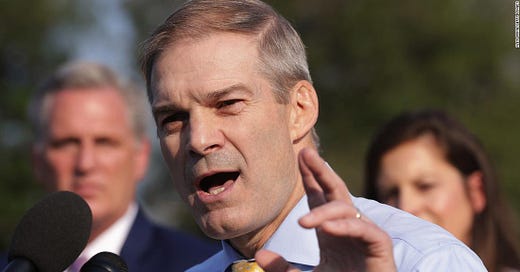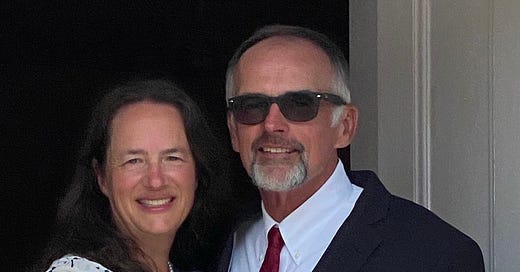
On May 22, 1964, in a graduation speech at the University of Michigan, President Lyndon Johnson put a name to a new vision for the United States. He called it “the Great Society” and laid out the vision of a country that did not confine itself to making money, but rather used its post–World War II prosperity to “enrich and elevate our national life.” That Great Society would demand an end to poverty and racial injustice.
But it would do more than that, he promised: it would enable every child to learn and grow, and it would create a society where people would use their leisure time to build and reflect, where cities would not just answer physical needs and the demands of commerce, but would also serve “the desire for beauty and the hunger for community.” It would protect the natural world and would be “a place where men are more concerned with the quality of their goals than the quantity of their goods.”
“But most of all,” he said, it would look forward. “[T]the Great Society is not a safe harbor, a resting place, a final objective, a finished work. It is a challenge constantly renewed, beckoning us toward a destiny where the meaning of our lives matches the marvelous products of our labor.”
Johnson proposed rebuilding the cities, protecting the countryside, and investing in education to set “every young mind…free to scan the farthest reaches of thought and imagination.” He admitted that the government did not have the answers to addressing the problems in the country, “[b]ut I do promise this,” he said. “We are going to assemble the best thought and the broadest knowledge from all over the world to find those answers for America. I intend to establish working groups to prepare a series of White House conferences and meetings—on the cities, on natural beauty, on the quality of education, and on other emerging challenges. And from these meetings and from this inspiration and from these studies we will begin to set our course toward the Great Society.”
Johnson’s vision of a Great Society came from a very different place than the reworking of society launched by his predecessor, Franklin D. Roosevelt, in the 1930s. Roosevelt’s New Deal had used the federal government to address the greatest economic crisis in U.S. history, leveling the playing field between workers and employers to enable workingmen to support their families. Johnson, in contrast, was operating in a country that was enjoying record growth. Far from simply saving the country, he could afford to direct it toward greater things.
Immediately, the administration turned to addressing issues of civil rights and poverty. Under Johnson’s pressure, Congress passed the Civil Rights Act of 1964 prohibiting voting, employment, or educational discrimination based on race, religion, sex, or national origin. Johnson also won passage of the Economic Opportunity Act of 1964, which created an Office of Economic Opportunity which would oversee a whole series of antipoverty programs, and of the Food Stamp Act, which helped people who didn’t make a lot of money buy food.
When Republicans ran Arizona senator Barry Goldwater for president in 1964, calling for rolling back business regulation and civil rights to the years before the New Deal, voters who quite liked the new system gave Democrats such a strong majority in Congress that Johnson and the Democrats were able to pass 84 new laws to put the Great Society into place.
They cemented civil rights with the 1965 Voting Rights Act protecting minority voting, created jobs in Appalachia, and established job-training and community development programs. The Elementary and Secondary Education Act of 1965 gave federal aid to public schools and established the Head Start program to provide comprehensive early education for low-income children. The Higher Education Act of 1965 increased federal investment in universities and provided scholarships and low-interest loans to students.
The Social Security Act of 1965 created Medicare, which provided health insurance for Americans over 65, and Medicaid, which helped cover healthcare costs for folks with limited incomes. Congress advanced the war on poverty by increasing welfare payments and subsidizing rent for low-income families.
Congress took on the rights of consumers with new protective legislation that required cigarettes and other dangerous products to carry warning labels, required products to carry labels identifying the manufacturer, and required lenders to disclose the full cost of finance charges in loans. Congress also passed legislation protecting the environment, including the Water Quality Act of 1965 that established federal standards for water quality.
But the government did not simply address poverty. Congress also spoke to Johnson’s aspirations for beauty and purpose when it created the National Foundation on the Arts and Humanities. This law created both the National Endowment for the Arts and the National Endowment for the Humanities to make sure the era’s emphasis on science didn’t endanger the humanities. In 1967 it would also establish the Corporation for Public Broadcasting, followed in 1969 by National Public Radio.
Opponents of this sweeping program picked up 47 seats in the House and three seats in the Senate in the 1966 midterm elections, and U.S. News and World Report wrote that “the big bash” was over.
And yet, much of the Great Society still lives on, although it is now under more significant challenges every day from those who reject the idea that the federal government has a role to play in the shaping of our society.
“For better or worse,” Johnson told the University of Michigan graduates in 1964, “your generation has been appointed by history to deal with those problems and to lead America toward a new age. You have the chance never before afforded to any people in any age. You can help build a society where the demands of morality, and the needs of the spirit, can be realized in the life of the Nation.
“So, will you join in the battle to give every citizen the full equality which God enjoins and the law requires, whatever his belief, or race, or the color of his skin?” he asked.
“Will you join in the battle to give every citizen an escape from the crushing weight of poverty?...”
“There are those timid souls who say this battle cannot be won; that we are condemned to a soulless wealth. I do not agree. We have the power to shape the civilization that we want. But we need your will, your labor, your hearts, if we are to build that kind of society.”
—
Notes:
https://www.presidency.ucsb.edu/documents/remarks-the-university-michigan
U.S. News and World Report quotation is in Mary C. Brennan, Turning Right in the Sixties: The Conservative Capture of the GOP, p. 119.










And all of that came to a crashing halt at 0100 Hours (Golf) on August 4, 1964, when the American destroyers Maddox and Turner Joy reported themselves under attack from "North Vietnamese torpedo boats" in the Gulf of Tonkin. That night when he was notified of the event, Lyndon Johnson was literally the only guy on the planet who - unknowingly - got it right about what had actually happened when he exclaimed "Those poor dumb sailors were probably shooting at flying fish." Indeed, in 2006, it was determined that "the lights in the water" the ships reported were the reflection of the moon and the lightning flashes from the storms, on the enormous school of flying fish that annually transit the Gulf of Tonkin in the first week of August.
Had it not been for my best friend from boot camp, by then a Fire Controlman 2nd Class, in the Maddox's gun tower, three times refusing the order to open fire, telling the captain "there's nothing out there except the other ship" the destroyers might have opened fire on each other. He got a general court martial for "failure to obey a direct order" and busted to E-3, and we didn't get World War III. (I was on the staff of the operational command for the destroyers, and learned that truth a month after the event when I walked into a bar in Olongapo and found my friend sitting at the bar, where he told me the story. I have divided my life ever since Before Tonkin Gulf and After Tonkin Gulf. Finding that out was what turned my life around 180 degrees and created the person you know now.)
Yes, we went to war in Vietnam because of flying fish.
And, across the "Percific" Orstralia yesterday has just dumped the wanna-be GOP (LNP) rather dramatically - it's going to be an interesting exercise re-directing Labor (the winner) who are really LNP lite, to a better mindset - it can be done. The Green vote has really increased - but, you see, we are a multi party society, and we have compulsory voting, and we have preferential voting (which means no vote gets lost) and we use PENCIL AND PAPER to record our votes. Plus we have an Australian Electoral Commission which sets the electoral boundaries across the whole country - no gerrymandering and uniform electoral procedures everywhere. Can the USA follow our example?????